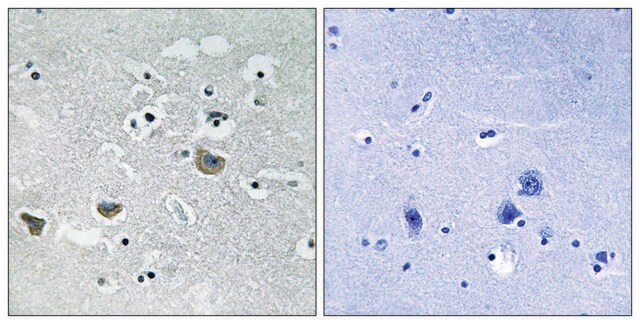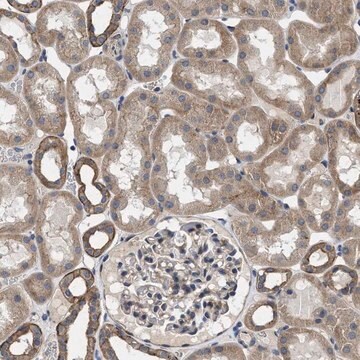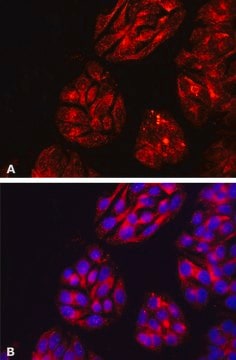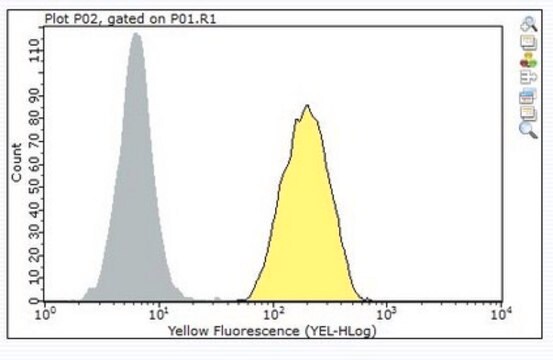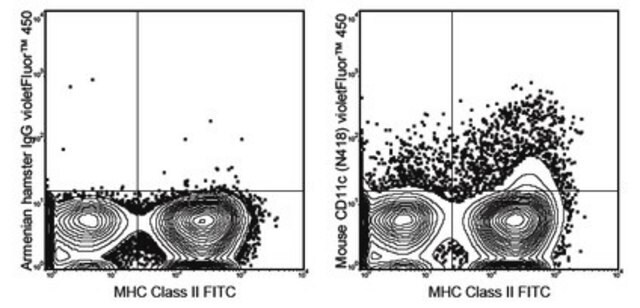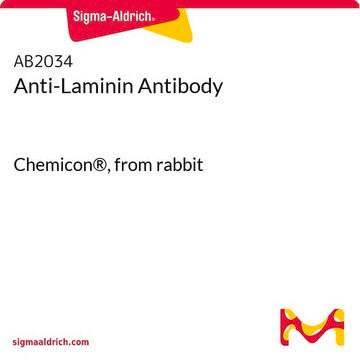SAB4700142
Monoclonal Anti-CD80-FITC antibody produced in mouse
clone MEM-233, purified immunoglobulin, buffered aqueous solution
Sinonimo/i:
Anti-B7-1
Autenticatiper visualizzare i prezzi riservati alla tua organizzazione & contrattuali
About This Item
Codice UNSPSC:
12352203
NACRES:
NA.44
Prodotti consigliati
Origine biologica
mouse
Livello qualitativo
Coniugato
FITC conjugate
Forma dell’anticorpo
purified immunoglobulin
Tipo di anticorpo
primary antibodies
Clone
MEM-233, monoclonal
Stato
buffered aqueous solution
Reattività contro le specie
human
tecniche
flow cytometry: suitable
Isotipo
IgG1
N° accesso NCBI
N° accesso UniProt
Condizioni di spedizione
wet ice
Temperatura di conservazione
2-8°C
modifica post-traduzionali bersaglio
unmodified
Informazioni sul gene
human ... CD80(941)
Descrizione generale
Cluster of differentiation 80 (CD80), also called as lymphocyte activation antigen 7-1, is encoded by the gene mapped to human chromosome 3q13.33. The encoded protein is mainly expressed on antigen presenting cells such as, neutrophils, macrophages and dendritic cells.
The antibody MEM-233 reacts with CD80 (B7-1), a 60 kDa single chain type I glycoprotein of immunoglobulin supergene family, expressed on professional antigen-presenting cells, such as dendritic cells, macrophages or activated B lymphocytes.
Immunogeno
Extracellular domain of human CD80 fused to human IgG1(Fc)
Applicazioni
The reagent is designed for Flow Cytometry analysis of human blood cells using 20 μL reagent / 100 μL of whole blood or 1e6 cells in a suspension. The content of a vial (2 mL) is sufficient for 100 tests.
Azioni biochim/fisiol
Cluster of differentiation 80 (CD80) interacts with its ligand, co-stimulator ligand CD28 or with cytotoxic T-lymphocyte protein 4 (CTLA-4) and facilitates the regulation of CD4+ and CD8+ T cell activity. Elevated urinary CD80 excretion leads to Fabry disease. CD80, which is expressed on surface of dendritic cells acts as a key co-stimulatory molecule and induces second signal for the proper stimulation of cancer antigen-specific naive T cells.
Caratteristiche e vantaggi
Evaluate our antibodies with complete peace of mind. If the antibody does not perform in your application, we will issue a full credit or replacement antibody. Learn more.
Stato fisico
Solution in phosphate buffered saline containing 15 mM sodium azide and 0.2% high-grade protease free BSA as a stabilizing agent.
Esclusione di responsabilità
Unless otherwise stated in our catalog or other company documentation accompanying the product(s), our products are intended for research use only and are not to be used for any other purpose, which includes but is not limited to, unauthorized commercial uses, in vitro diagnostic uses, ex vivo or in vivo therapeutic uses or any type of consumption or application to humans or animals.
Non trovi il prodotto giusto?
Prova il nostro Motore di ricerca dei prodotti.
Codice della classe di stoccaggio
10 - Combustible liquids
Classe di pericolosità dell'acqua (WGK)
WGK 2
Punto d’infiammabilità (°F)
Not applicable
Punto d’infiammabilità (°C)
Not applicable
Scegli una delle versioni più recenti:
Possiedi già questo prodotto?
I documenti relativi ai prodotti acquistati recentemente sono disponibili nell’Archivio dei documenti.
Prediction of Radix Astragali Immunomodulatory Effect of CD80 Expression from Chromatograms by Quantitative Pattern-Activity Relationship.
Ng MC
BioMed Research International (2017)
Association Analyses Identify Three Susceptibility Loci for Vitiligo in the Chinese Han Population
Tang XF
The Journal of Investigative Dermatology, 133, 403-410 (2013)
Increased urinary CD80 excretion and podocyturia in Fabry disease
Trimarchi H
Journal of Translational Medicine, 14 (2016)
Diana Campioni et al.
Haematologica, 91(3), 364-368 (2006-03-15)
The immunophenotypic analysis of ex vivo-expanded mesenchymal stromal cells (MSC) has so far been confined to single or dual staining analysis in normal subjects. In this study, using a four-color cytofluorimetric protocol, we demonstrated that cultured MSC derived from the
Emily Charrier et al.
Biology of blood and marrow transplantation : journal of the American Society for Blood and Marrow Transplantation, 20(10), 1501-1507 (2014-08-17)
Plasmacytoid dendritic cells (pDCs) initiate both innate and adaptive immune responses, making them attractive targets for post-transplantation immunotherapy, particularly after cord blood transplantation (CBT). Toll-like receptor (TLR) agonists are currently studied for pDC stimulation in various clinical settings. Their efficacy
Il team dei nostri ricercatori vanta grande esperienza in tutte le aree della ricerca quali Life Science, scienza dei materiali, sintesi chimica, cromatografia, discipline analitiche, ecc..
Contatta l'Assistenza Tecnica.